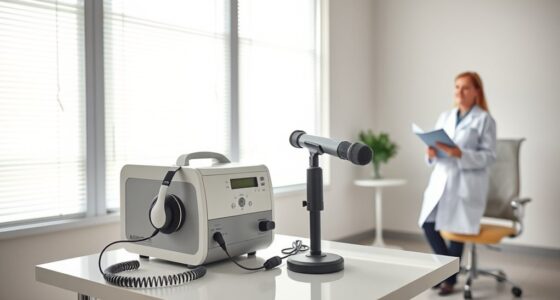To win a VA tinnitus claim, you need solid, well-documented evidence linking your symptoms to service. This includes clear diagnosis from a healthcare provider, records of noise exposure, and personal statements describing how tinnitus affects your daily life. Supporting logs, buddy statements, and medical records strengthen your case. Consistently demonstrating the severity and impact increases your chances of approval. If you want to understand the key evidence that makes your claim stand out, keep exploring further.
Key Takeaways
- Obtain a clear diagnosis from a healthcare professional and ensure it thoroughly documents tinnitus effects on daily life.
- Gather and submit medical records, buddy statements, and logs showing how tinnitus impacts sleep and concentration.
- Provide evidence linking tinnitus to military noise exposure, such as service treatment records or detailed personal statements.
- Attend VA examinations prepared to describe symptoms honestly and consistently, emphasizing severity and service connection.
- Organize all supporting documents comprehensively to strengthen the claim and demonstrate the true impact of tinnitus.

Winning a VA tinnitus claim can feel overwhelming, but understanding the process and how to present your case effectively can substantially improve your chances. The first step is ensuring you have a clear tinnitus diagnosis from a healthcare professional. This diagnosis serves as the foundation for your claim, establishing that you genuinely experience the ringing or buzzing in your ears. Without it, the VA’s VA disability process becomes much more challenging, as they require objective evidence to support your subjective symptoms. Be sure your provider documents the diagnosis thoroughly, including how tinnitus affects your daily life.
Once you have your diagnosis, it’s essential to understand how the VA evaluates tinnitus claims. The VA does not require evidence of a specific level of hearing loss, unlike other disabilities. Instead, they focus on whether your tinnitus is service-connected and how it impacts you. The VA disability process involves submitting proof of service connection, which means showing that your tinnitus resulted from your military service. This could involve providing service treatment records, buddy statements, or other supporting evidence that links your tinnitus to your military duties, especially if you experienced exposure to loud noises or explosions.
VA focuses on service connection and impact, not specific hearing loss levels, for tinnitus claims.
When gathering evidence, focus on emphasizing the severity and impact of your tinnitus. Personal statements describing how tinnitus interferes with your sleep, concentration, or overall quality of life are vital. The VA values consistent, detailed accounts of your symptoms. If possible, include logs or diaries documenting episodes, severity, and how they affect your daily routines. Supporting medical records that detail your tinnitus diagnosis and any treatments or assessments can also strengthen your case. Additionally, understanding the significance of service-related noise exposure can help in establishing a stronger connection to your military service.
Another key aspect is ensuring your claim is complete and well-organized. Missing or incomplete evidence can delay the process or result in a denial. It’s advisable to submit everything that can corroborate your tinnitus claim — from your medical records to lay statements from family or friends who observe how your tinnitus impacts you.
Lastly, be prepared to attend VA examinations if scheduled. During these exams, a VA doctor will evaluate your tinnitus and how it affects you. Be honest, detailed, and consistent in describing your symptoms. Remember, your goal is to convince the VA that your tinnitus is a service-connected disability that warrants compensation. By focusing on strong evidence, clear documentation, and thorough explanations, you considerably improve your chances of winning your VA tinnitus claim.
Top picks for "winn tinnitu claim"
Open Amazon search results for this keyword.
As an affiliate, we earn on qualifying purchases.
Frequently Asked Questions
How Long Does the VA Process Typically Take?
The VA process for tinnitus claims usually takes between 3 to 6 months, but it can vary depending on your case and VA processing times. During this period, you may need to undergo tinnitus tests to support your claim. Promptly submitting all required evidence helps accelerate the VA processing. Stay patient and keep track of your claim status to ensure everything moves smoothly.
Can Secondary Conditions Increase Tinnitus Disability Ratings?
Yes, secondary conditions can increase your tinnitus disability ratings. When secondary conditions, like hearing loss or depression, worsen your tinnitus severity, they can lead to a higher disability rating. The VA considers how these conditions impact your overall health and daily life. To maximize your claim, provide detailed medical evidence showing how secondary conditions contribute to increased tinnitus severity. This helps guarantee your disability rating reflects your full experience.
Is Private Medical Evidence Accepted for VA Claims?
Your best bet is to present Private Medical Evidence, including detailed Medical Records, to support your claim. The VA does accept private evidence, but it must be credible and relevant. Think of it as covering all your bases — the more thorough your private records, the stronger your case. Make sure your private medical evidence clearly links your tinnitus to your service, boosting your chances of a favorable outcome.
How Does Age Affect Tinnitus Disability Ratings?
Age impact on tinnitus disability ratings can lead to rating variations, as VA considers how age-related hearing loss or other health issues might influence your condition. While age doesn’t directly increase your tinnitus rating, it may affect how the VA evaluates the overall impact on your life. Be aware of these rating variations, and provide thorough evidence to accurately reflect your condition’s severity regardless of your age.
Are There Specific Tests to Verify Tinnitus Severity?
You can’t rely on a single test to measure tinnitus severity, but audiological testing is essential in tinnitus measurement. These tests evaluate your hearing and help identify the impact of tinnitus on your auditory system. While no definitive test can quantify tinnitus directly, your audiologist assesses your responses to sound, helping establish the severity and guiding your VA claim process. Be honest and thorough during your audiological evaluation for the best results.
Conclusion
Remember, gathering solid evidence is your strongest tool in winning your VA tinnitus claim. Some might think their case isn’t strong enough or worry about the hassle, but don’t let that stop you. Clear, detailed documentation can make all the difference. Keep pushing forward, stay organized, and focus on the facts. With the right evidence, you markedly increase your chances of a successful claim—so don’t give up, your victory is within reach.










